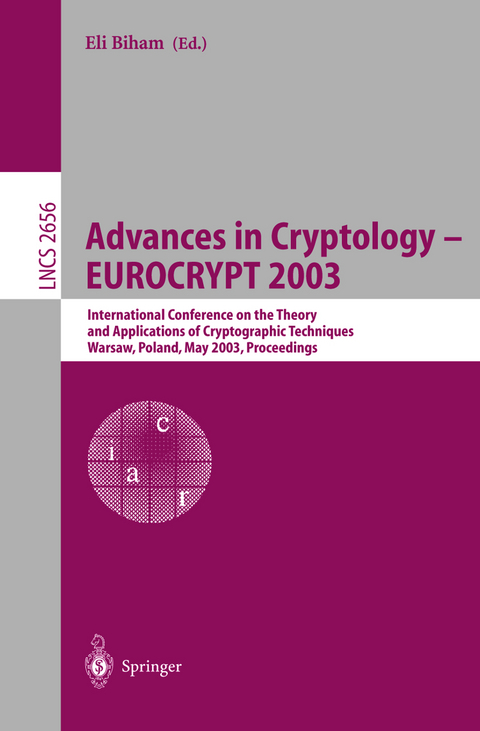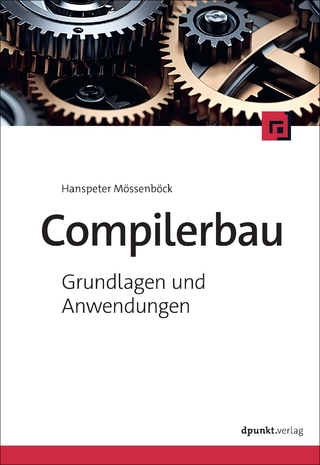
Advances in Cryptology – EUROCRYPT 2003
Springer Berlin (Verlag)
978-3-540-14039-9 (ISBN)
Cryptanalysis I.- Cryptanalysis of the EMD Mode of Operation.- On the Optimality of Linear, Differential, and Sequential Distinguishers.- A Toolbox for Cryptanalysis: Linear and Affine Equivalence Algorithms.- Secure Multi-party Computation I.- Two-Threshold Broadcast and Detectable Multi-party Computation.- On the Limitations of Universally Composable Two-Party Computation without Set-up Assumptions.- Fair Secure Two-Party Computation.- Invited Talk I.- Facts and Myths of Enigma: Breaking Stereotypes.- Zero-Knowledge Protocols.- Resettable Zero-Knowledge in the Weak Public-Key Model.- Simulatable Commitments and Efficient Concurrent Zero-Knowledge.- Simulation in Quasi-Polynomial Time, and Its Application to Protocol Composition.- Strengthening Zero-Knowledge Protocols Using Signatures.- Foundations and Complexity Theoretic Security.- Nearly One-Sided Tests and the Goldreich-Levin Predicate.- Efficient and Non-malleable Proofs of Plaintext Knowledge and Applications.- Public Key Encryption.- A Public Key Encryption Scheme Based on the Polynomial Reconstruction Problem.- A Simpler Construction of CCA2-Secure Public-Key Encryption under General Assumptions.- A Forward-Secure Public-Key Encryption Scheme.- Certificate-Based Encryption and the Certificate Revocation Problem.- New Primitives.- CAPTCHA: Using Hard AI Problems for Security.- Concealment and Its Applications to Authenticated Encryption.- Cryptanalysis II.- Predicting the Shrinking Generator with Fixed Connections.- Algebraic Attacks on Stream Ciphers with Linear Feedback.- Elliptic Curves Cryptography.- Counting Points on Elliptic Curves over Finite Fields of Small Characteristic in Quasi Quadratic Time.- The GHS Attack Revisited.- Improved Algorithms for Efficient Arithmetic on Elliptic Curves Using Fast Endomorphisms.- Digital Signatures.- A Signature Scheme as Secure as the Diffie-Hellman Problem.- Aggregate and Verifiably Encrypted Signatures from Bilinear Maps.- Hypercubic Lattice Reduction and Analysis of GGH and NTRU Signatures.- Invited Talk II.- Why Provable Security Matters?.- Cryptanalysis III.- On the Security of RDSA.- Cryptanalysis of the Public-Key Encryption Based on Braid Groups.- A Theoretical Treatment of Related-Key Attacks: RKA-PRPs, RKA-PRFs, and Applications.- Key Exchange.- Provably Secure Threshold Password-Authenticated Key Exchange.- A Framework for Password-Based Authenticated Key Exchange.- Information Theoretic Cryptography.- The Security of Many-Round Luby-Rackoff Pseudo-Random Permutations.- New Bounds in Secret-Key Agreement: The Gap between Formation and Secrecy Extraction.- Secure Multi-party Computation II.- Round Efficiency of Multi-party Computation with a Dishonest Majority.- Efficient Multi-party Computation over Rings.- Group Signatures.- Foundations of Group Signatures: Formal Definitions, Simplified Requirements, and a Construction Based on General Assumptions.- Extracting Group Signatures from Traitor Tracing Schemes.
| Erscheint lt. Verlag | 22.4.2003 |
|---|---|
| Reihe/Serie | Lecture Notes in Computer Science |
| Zusatzinfo | XIV, 654 p. |
| Verlagsort | Berlin |
| Sprache | englisch |
| Maße | 155 x 235 mm |
| Gewicht | 921 g |
| Themenwelt | Mathematik / Informatik ► Informatik ► Programmiersprachen / -werkzeuge |
| Informatik ► Theorie / Studium ► Compilerbau | |
| Schlagworte | Algorithm analysis and problem complexity • Communication • Complexity • Cryptanalysis • cryptographic primitives • Cryptographic Systems • cryptography • Cryptology • Data Security • Digital Signature Systems • Elliptic Curve Cryptography • Elliptic Curves • group computation • Hardcover, Softcover / Informatik, EDV/Informatik • HC/Informatik, EDV/Informatik • Information • Information Theory • public key cryptology • secure communication • security • Systems Security |
| ISBN-10 | 3-540-14039-5 / 3540140395 |
| ISBN-13 | 978-3-540-14039-9 / 9783540140399 |
| Zustand | Neuware |
| Haben Sie eine Frage zum Produkt? |
aus dem Bereich


